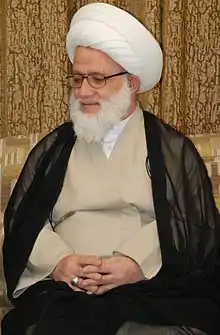Mohammad Yaqoobi
Ayatollah Mohammad al-Yaqoobi (Arabic: محمد اليعقوبي; born 9 September 1960) is a prominent Iraqi Twelver Shi'a Marja'.[1][2] He is the second most widely followed Marja' in Iraq, the most widely followed being Ali al-Sistani.[3] As well as heading the Al-Sadr Religious University in Najaf, he established one of the largest women's Hawzas in Iraq, and oversees many charitable organisations within Iraq.[4][5] He is an active figure within Iraqi politics, and is considered by the Hawza to be the spiritual successor of Mohammad Mohammad Sadeq al-Sadr and the school of Muhammad Baqir al-Sadr.[6]
Grand Ayatollah Muhammad al-Yaqoobi | |
|---|---|
 | |
| Other names | Arabic: محمد اليعقوبي |
| Personal | |
| Born | September 9, 1960 |
| Religion | Usuli Twelver Shi`a Islam |
| Other names | Arabic: محمد اليعقوبي |
| Senior posting | |
| Based in | Najaf, Iraq |
| Period in office | 2003–present |
| Predecessor | Mohammad Mohammad Sadeq al-Sadr |
| Post | Grand Ayatollah |
| Website | www |
| Part of a series on Shia Islam |
| Twelvers |
|---|
|
|
Education
Yaqoobi graduated with a BA in Civil Engineering from the University of Baghdad in 1982 and joined the Hawza Najaf in 1988. In Najaf, he studied under various scholars, most notably Ayatollah Abu al-Qasim al-Khoei, under whom he was ordained with his religious turban, and Aytollah Mohammad Mohammad Sadeq al-Sadr. He maintained a close relationship with Grand Ayatollah Mohammad Mohammad Sadeq al-Sadr, who, amongst others, granted him his Ijtihad in 1998.[7] Amongst these testimonies is the Ijtihad testimony of Mohammad Sadeqi Tehrani, the well known expert exegete of the Quran and student of Muhammad Husayn Tabatabai who in particular highlights Yaqoobi's expertise in deriving religious law from the Quran.[8]
See also
References
- List of Maraji in Arabic Archived 2012-11-02 at the Wayback Machine
- Official Website
- Fotini Christia, Elizabeth Dekeyser and Dean Knox, To Karbala: Surveying Religious Shia from Iran and Iraq, Massachusetts Institute of Technology (2016)
- Mervin Sabrina, Les mondes chiites et l'Iran, Karthala (2007)